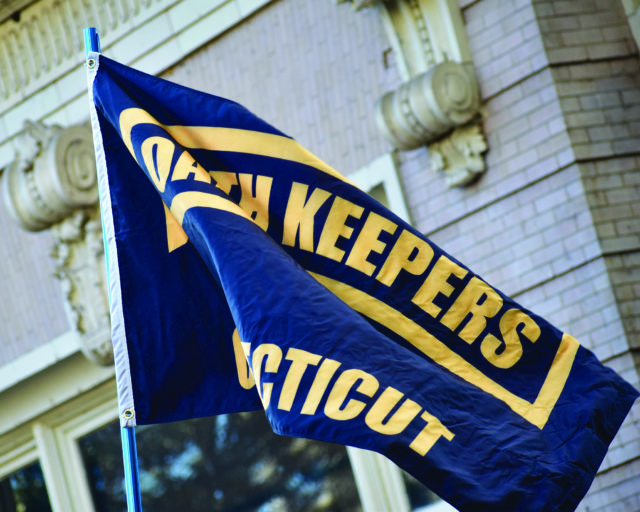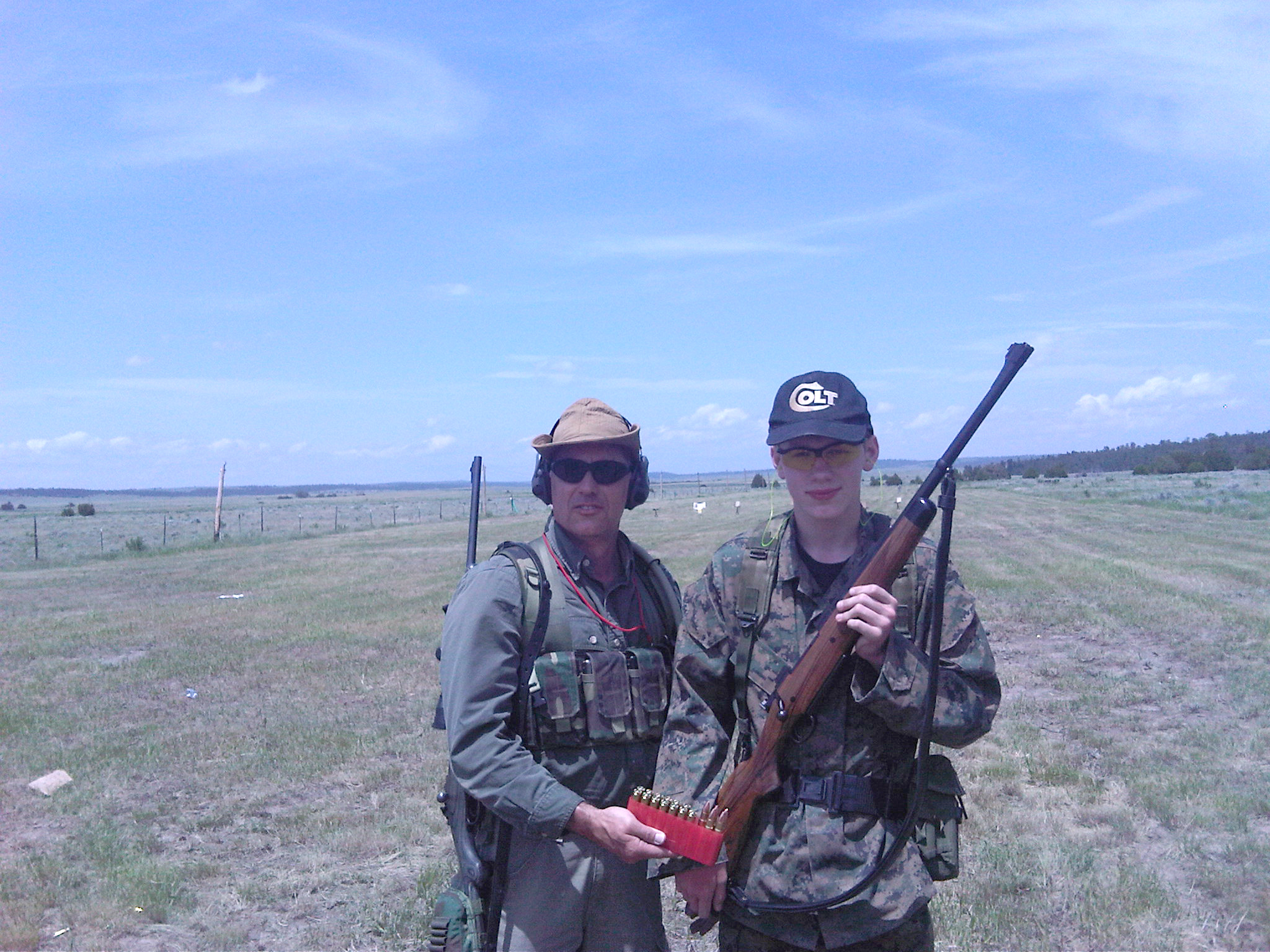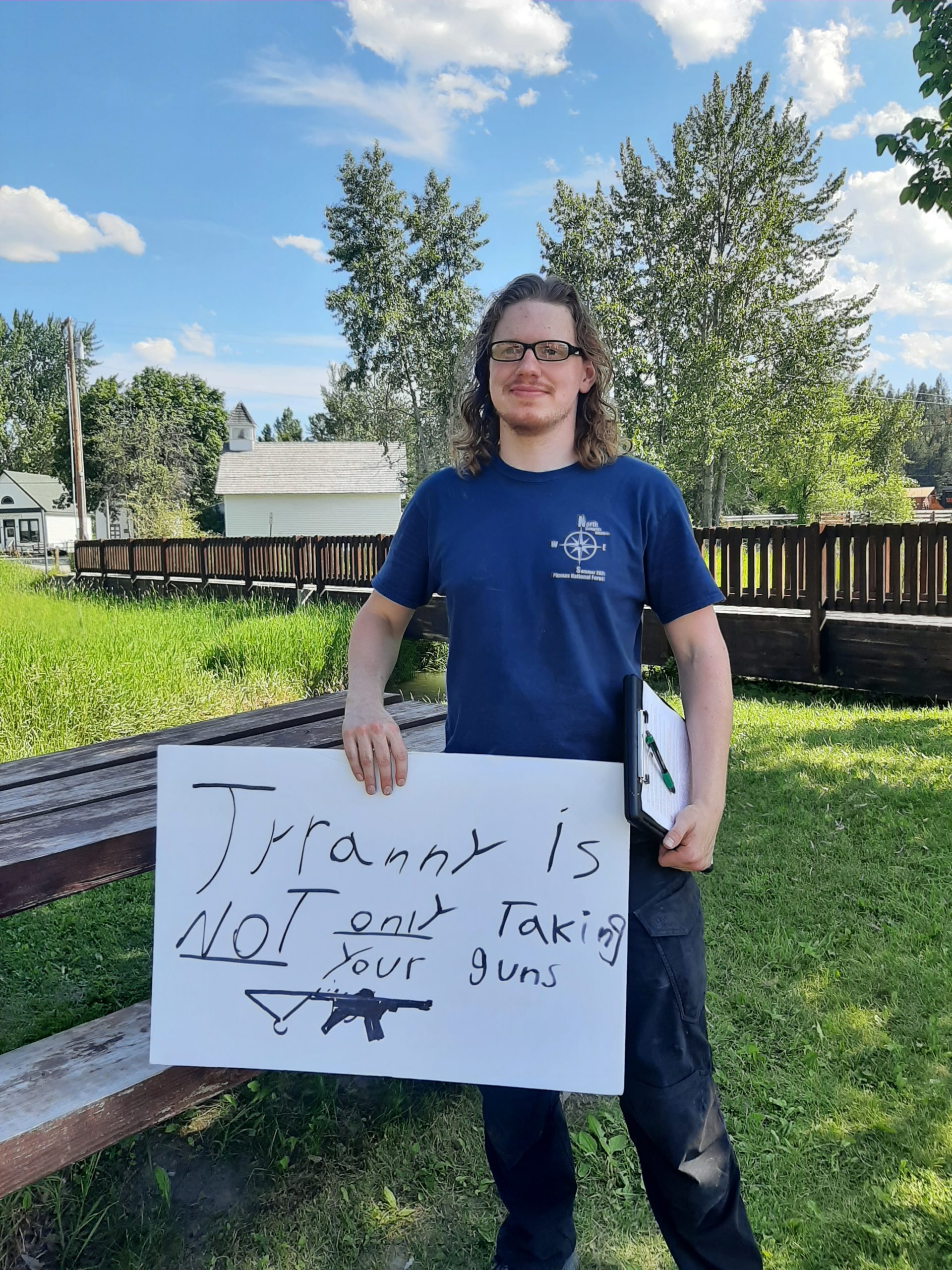
My name is Dakota Adams.
Unfortunately, I am Oath Keeper Stewart Rhodes’ son. And unfortunately for both of us, I may be relevant to you.
It is now undeniable that radicalization and the draw of right-wing extremist thought is a significant problem facing the nation, perhaps a fatal crisis, and in this context, there’s a lot of interest in the stories of people who came back from the right-wing fringe. I have only my niche experience to offer from a very odd life. But I’ve been told that this might be valuable to those interested in how I went from a teenage militiaman who believed in Pizzagate to casting off my birth name of Dakota Stewart Rhodes and joining BLM and pro-choice protests.
If tracing the stumbling, fumbling path to independent thought taken by the son of an insurrectionist militia leader contains a valuable lesson, I have a responsibility to show you all. If there’s a chance my story will be of any help to millions of people who have lost family and friends to right-wing cult behavior, then I have an obligation to tell it.
So, this is how I left the far right.

To begin with, I wasn’t always what most people think of when they picture the current crop of “Alt Rite” frat bros and angry bitter incels (I was never that bitter). My political life started in the Libertarian right explosion that was the 2008 Ron Paul campaign, caught as a child in the wake of my father’s ambition, even before Oath Keepers, as he made a name for himself as a campaign organizer. Stewart asserted authority by banking off his law degree, military background, and former staff position at the office of Paul himself.
I gained political consciousness attending sign-making parties with all the weirdos and misfits who felt out of place in the mainstream GOP, even some crossover Democrats from the Occupy Wall Street crowd, but still undeniably steeped in right-wing ideology. There was something that would echo later in a much worse year: The belief that only bringing in an outsider candidate, even a crazy one, could fix the system.
Implicit in everything was the sense that even the GOP, with its authoritarian tendencies and bloodthirsty enthusiasm for the global war on terror, was inherently more closely aligned with “us” enlightened souls than anyone on the left. By our ideology, even left Libertarians would inevitably bring about socialism by introducing clear tools of statism like progressive taxation, environmental protection, and dreaded death-panel socialized healthcare, setting off the brief half-life of all socialist government systems as they actively decayed into communism. Left Anarchists would simply skip the intermediary and go to full communism immediately, ironically instituting the most government-ful of all governments. Socialism, after all, is when the government does stuff, the more stuff the more socialist, with communism as its natural endpoint.
The GOP, being fervently against socialism, must therefore be on the lighter end of the government authority spectrum, despite its decades-long love affair with militarized police and the surveillance state. In events, connections, strategy, and policy, the Libertarian right would continue to align itself with big government conservatives as a holding action against Democrats. More charitably, it could have been considered an attempt to convert the GOP from the inside.
Of course, Ron Paul would lose. In the ensuing panic and dissolution of the nascent Liberty Movement, my father would seize the time and place to found Oath Keepers and redirect the considerable grassroots energy that was now aimless and directionless, playing on his particular background to secure a niche. Oath Keepers would broadcast a message of hope, at least in the early years, and retain something of the emotional core of the activist outsider politics spirit that had given the Ron Paul following its animus. Under the surface, Stewart Rhodes was already playing to the fears of conservatives about the incoming Obama administration, particularly on guns, alluding to FEMA camp conspiracy theories and riding the bleak outlook of preppers and doomsdayers to success.
The sense that the Ron Paul campaign was the last best hope for avoiding economic collapse and New World Order takeover, prophesied by survivalists nationwide for decades on end, was prevalent. Now that the last hope was shattered, the die was irreversibly cast.
This, too, would reverberate later.
My own childhood politics of course grew harder and more fringe in my survivalist adolescence, as Oath Keepers transformed into Stewart’s roving private army and income machine behind the veterans’ org facade, but the drift into further anti-government belief wasn’t quite what would set me up to fall for the Cult of Number 45 later on. Neither were the anonymous internet boards filled with outcasts and edge cases, efficiently compromised by white supremacist recruiters, the strongest influence, although the endless MAGA memes that would pour through that vector certainly made an impact. I had carried on the activist spirit of the sign parties for a while, evangelizing Ron Paul’s “real” message, the one the media kept you from hearing, and the good words of Bo Gritz and Ayn Rand to the online masses (that last with some caveats, even then).
Over time, the sheer weight of depression and stress from the constant looming civil war and fall of society ground me down, and outlasting Bernie Bros in online arguments lost its luster with everything else. I spent my remaining adolescence with one foot in apocalypse training and one foot in basement-dwelling NEET-dom, burying myself in the internet to avoid having to think about The Coming End and taking shelter in web novels and anime when life became unbearable.
The Coming End ruled my life, variously called The Collapse, The Crash, the End of Days (for the religious), and sometimes in our family wryly referred to as the “a-Cop-alypse.” It was an economic crash, a nuclear war, a mass terrorist attack, a natural disaster, any event that would end civil society and reduce the United States to a war of all against all as the starving masses turned on each other, local warlords with looted military hardware rising to fill the power vacuum. All of this was of course to be engineered by nefarious forces within the government, taking advantage of a naturally occurring crisis causing one directly to create a situation so bad that most people would beg for a totalitarian rule that would restore order to the chaos.
The government faking a biological terrorist attack by a hostile nation like Iran, a ‘false flag’ attack, to create domestic chaos and start a convenient war simultaneously was a popular scenario. The cause varied with the headlines and the times, fallout from Fukushima or a North Korean EMP attack as examples, but the belief remained concrete and it was always at most 18 months away.
Some welcomed The Collapse as a chance to start society over again, others harbored juvenile fantasies of their survivalism paying off in social status and sexual conquest when the fall of civilization made them superior to the starving ‘nu-males,’ others simply believed in it as an inevitability to be weathered, or as a fulfillment of biblical prophecy. Some, like me, lived in unending fear.
I knew my family was not ready to survive a collapse, not under Stewart’s leadership.
By the time Trump became the clear front-runner in the Republican primary, the end-of-days stress cycle I lived in had worn me down, leaving me primed for cult recruitment. I was beginning to lose my all-encompassing fear of The End after it had repeatedly failed to materialize, just enough to have cognitive space left for deep, bitter anger. My entire life, the perceived actions of political elites and policymakers had been cause for household panic, from domestic to international events that were nonetheless evidence of the New World Order at work.
The Muslim Brotherhood in 2012 Egypt being implicated in a rocket attack on Israel was somehow blamed on shadowy NWO power brokers, working to promote war, and obviously a domino that would lead to us struggling to survive the violent U.S. balkanization through fuzzy logic I cannot recall. Every political move large and small by The Establishment was a source of terror and despair when filtered through the paranoid lens I’d been raised with, and I’d had enough.
My belief in the end of days and sinister conspiracies had waned, but the emotional mark had not. It was a weak point that would make me vulnerable to exploitation.

I had missed many online pipelines to well-known brands of right-wing extremism at this point, largely because I was thoroughly a child of the Constitutionalist Militia Movement and indoctrinated against competing right-wing ideologies.
I’d been trained to see conspiracies and psychological warfare in every shadow, and so I’d clocked the Nazi recruiting on messageboards instantly for the manipulation it was. I’d been raised in a cult of fanatical American Exceptionalism, and genuinely believed that the Constitutional Militia Movement was an anti-racist force unfairly maligned by liberal media (until, years down the line, I didn’t). The general racism of the unmoderated dark corners of the internet washed over me with no effect except warping my sense of humor.
I somehow ended up avoiding misogyny despite all efforts by my father and his circle. So, when early GamerGate turned from YouTubers like TotalBiscuit actually talking about ethical games journalism to become a firestorm of entitled sexually frustrated hatred, I stepped off the bandwagon.
By the time Trump hit the campaign trail, I had finally burnt out enough on Militia Ideology and The Coming End to be open to more mainstream populist politics. In my increasing doubts about whether The Collapse was really ever coming and the movement as a whole, I had lost the ideological core of my early life. Without fervent belief in the apocalypse and the militia’s role in it, I had nothing to anchor myself to except a vague emotional idea of American patriotism. I was finally one of Steve Bannon’s “rootless white males” and ready to be swept up in the next vast current.
Like a lot of people, for many different reasons, I felt robbed of the generally secure middle-class life that pop culture had implicitly promised. In the propaganda storm around Trump, I saw a glimmer of hope that things might be fixed, and certainly a chance to strike back at the Establishment that I blamed for the awful state of the country and my life.
I didn’t really see Trump as a savior, I saw him as the Bigly-est brick the American people could pick up and throw through the White House windows. After a lifetime of fearing the machinations of political machines too vast to comprehend, I saw their churning efforts terminate in the likes of Hillary Clinton and Jeb Bush, feeling simultaneously that this end state could not possibly be the work of a rational unified conspiracy and thoroughly fucking insulted. So I would pick Trump’s ugly, bulbous head up on election day and hurl the bastard as far as I could to demonstrate how thoroughly done We the People were with a process that consistently returned the blandest of the worst choices.
This was the first step in the memes getting to my psyche, the rabid Trump enthusiasm overriding my initial skepticism of Trump on constitutionalist grounds as my anger at the “the Establishment” made it easy to get swept along with the crowd.
I saw the early beta versions of QAnon come and go, numerous online handles claiming to be anonymous insiders from the Secret Service, FBI, and NSA leaking big news about upcoming arrests and secret espionage operations. Stewart bought into some, in particular a claim that the Clinton server contained mass amounts of damning information that could cause societal instability and foreign wars if released, and so had to be handled carefully. In the midst of this, the Q handle would emerge with its now distinctive style of vague allusions and almost Socratic style of rhetorical questions. Q would go on to become a mass cultural phenomenon and perhaps the founding of the next American religious movement, but it failed to appeal to me or catch my interest at the time.
I was of course deaf to the many Trump scandals, largely because I was increasingly insulated in Trump fan circles that massively downplayed them or simply ignored them. I wouldn’t see any of the clips of Trump blatantly lusting after his daughter, the Epstein party allegations, or the Russian mob connections for years to come. The Russia allegations, if anything, drove me further into the flabby yellow arms of Cult 45. I’d imbibed enough fear of Russian soldiers in UN blue being imported to keep the peace in post-collapse America in my life and I was done with it. My fury at John McCain for seeming to be seeking another Cold War knew no bounds; I was absolutely through with any kind of generational struggle or conflict. I just wanted to live my life, and if the system presented me with a selection of warmongers and a single untested clown, I was going for that red nose for no other reason than to shock the carnival barker who set my choices.
There was, of course, the chance that he might be surprisingly competent and fix everything, or at least not suck too badly. As a crass reality show star, I figured that he might just host some kind of bizarre media telethon from the Oval Office for four years straight and let his generally competent, if corporate stooge-heavy, cabinet run the country reasonably well. All he had to do was not start a major foreign war, keep ISIS down, avoid collapsing the economy, and he could be hailed as the next Reagan by the GOP forever (I as yet had no concept of what a bad president Reagan himself had been).
In my mind, the worst case was four years of W. Bush-esque gaffes bringing about a new golden age for Saturday Night Live parodies, before he left the White House to comfortably rule American mass media for the rest of his life.
If the economy could just not crash for a few years, if I could avoid being drafted to fight in a conflict in Ukraine that I then barely understood and largely didn’t care about, I might be able to get out of the shadow of Oath Keepers and the Fatherlord and have my own life.
Through 4chan and Reddit’s Trump communities, I was immersed in the Podesta email scandal, the conspiracy theories connecting Clinton lawyers to Central American pedophiles and executives for the Amber Alert system. They were entertaining, sometimes as outlandish as claims that Trump was a time traveler or had force field technology invented by Nikolai Tesla, and more and more they seemed oddly plausible. They fed the shining hope aspect of Trump’s appeal, beginning to paint every event as a move on a chess board that would bring down corrupt political conspiracies and big business. The outlandish and mundane theories existed together, interlinked, on a spectrum that allowed the reader to pick up whatever beliefs suited them and still be meshed within a generally like-minded online community.
The energy and enthusiasm became intoxicating in a way I hadn’t felt since the Paul campaign.
***
This is the first in a multi-part article. Part II will be published in Boulder Weekly’s July 21 issue.














